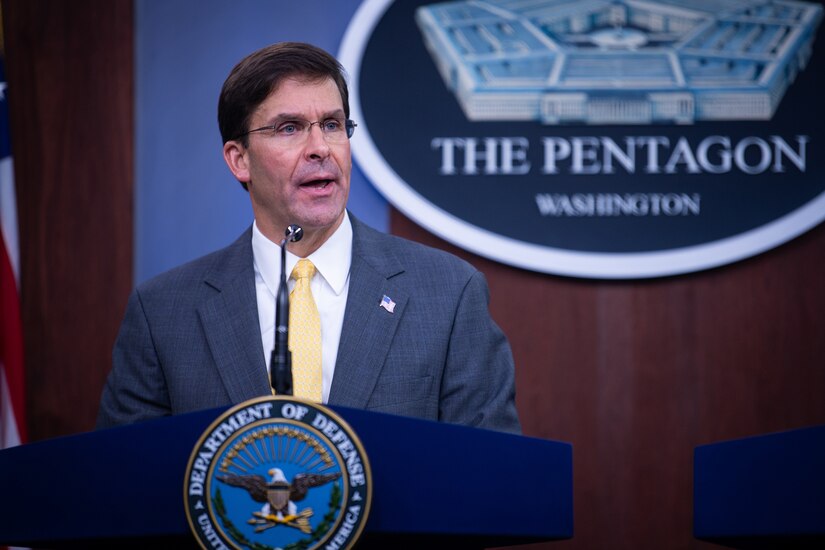By Aaron Mehta, Defense News
The Pentagon would consider allowing Turkey to rejoin the F-35 programonly if the Russian-made S-400 air defense system is completely removed from Turkish soil, meaning the government in Ankara could not simply keep the systems deactivated in warehouses, the Pentagon’s top official said Wednesday.
“They have to, again, get rid of the S-400 program and completely out of the country [before] we could consider that,” Secretary of Defense Mark Esper told press when asked about the possibility Turkey could find a way to again be part of the Joint Strike Fighter program.
“I have been very clear in both my public comments and privately with my Turkish counterpart: It’s either the F-35 or the S-400,” he said. “It’s not both. It’s not park one in the garage and roll the other one out. It’s one or the other. So we are where we are, and it’s regrettable.”
Turkey, a partner in the F-35 program that helped fund the development of the jet, planned to buy 100 F-35As. However, a decision by Ankara to purchase the S-400 threw a political bomb into the F-35 acquisition plan; the U.S. and its NATO allies expressed major concerns about the Russian system sharing airspace with the alliance’s newest fighter.
In July, Turkey took possession of the first S-400 pieces, and the U.S. formally kicked the country out of the F-35 program. As a result, by March 2020, Turkey’s industrial participation in the F-35 program will be done, with work shifted to U.S. companies.
Esper, Dunford Stress Strategy’s Key Role in American Defense
BY JIM GARAMONE-Department of Defense
The Defense Department will continue to make all decisions based on the National Defense Strategy and will follow the lines of effort — increasing lethality, encouraging alliances and partnerships, and reforming the department — that provide the strategy’s foundations, Defense Secretary Dr. Mark T. Esper said.
Speaking alongside Esper at a Pentagon news conference today, Marine Corps Gen. Joe Dunford, the chairman of the Joint Chiefs of Staff, supported the secretary’s statements and gave a quick summary of the steps the military has taken to support the strategy.
The strategy is based on four problem sets: the return of great power competition with China and Russia, changes in the character of war, the capacity of the force vis-a-vis operational commitments, and “the unprecedented pace of change in virtually every aspect of our profession,” Dunford said.
The U.S. military has changed how it plans, how it supports the secretary in making decisions, how it prioritizes resources and how it modernizes. “We have shifted from a traditional focus on operational plans for specific contingencies to plans that are globally oriented on each of the challenges addressed in the National Defense Strategy — China, Russia, Iran, North Korea and violent extremism,” the chairman said.
Esper has been in office for only a month, but it has been a busy month, as he has traveled to the Indo-Pacific region and is preparing to go to Europe. The secretary inherited the National Defense Strategy and said today that he stands fully behind it. The only change he has made is to the lines of effort, adding one: “Taking care of service members and their families,” he said.
The strategy is a realistic response to real concerns around the world, Esper said, noting that Russia and China are actively working to challenge the United States to enable their geopolitical aspirations. China and Russia are working to weaken America’s alliance network, and the two nations are bulking up their military capabilities. They want to replace an international system that has even benefitted them with one that works only to their advantage. “It is clear that China is engaging in a deliberate strategy to undermine the stability of the region,” Esper said. “It is clear that the values and behaviors of the Chinese Communist Party do not align with the vast majority states.”
Asian nations want the United States to remain involved in the region and want the United States to retain its leadership role, the secretary said.
Iran remains a problem regionally and globally, Esper said, and the United States has put in place Operation Sentinel to provide support to freedom of navigation in the Persian Gulf and adjacent waters. “Operation Sentinel is up and running, with the [United Kingdom], Australia and Bahrain joining us in this effort,” the secretary said. “The purpose of this operation is … to provide freedom of navigation for the commercial shipping that is so vital to global economic trade and … to deter provocations and avoid conflict in the region.”
The United States continues to work with other nations and would welcome their participation in this operation, he added.
Esper said he is excited about the activation of U.S. Space Command tomorrow. The command will “ensure the protection of America’s interest in space,” he said.
Air Force Gen. John W. Raymond will command the new combatant command. It will apply the necessary focus, energy and resources to the task of ensuring American dominance in space — a crucial domain for the military. “As a unified combatant command, the United States Space Command is the next crucial step towards the creation of an independent Space Force as an additional armed service,” Esper said.












